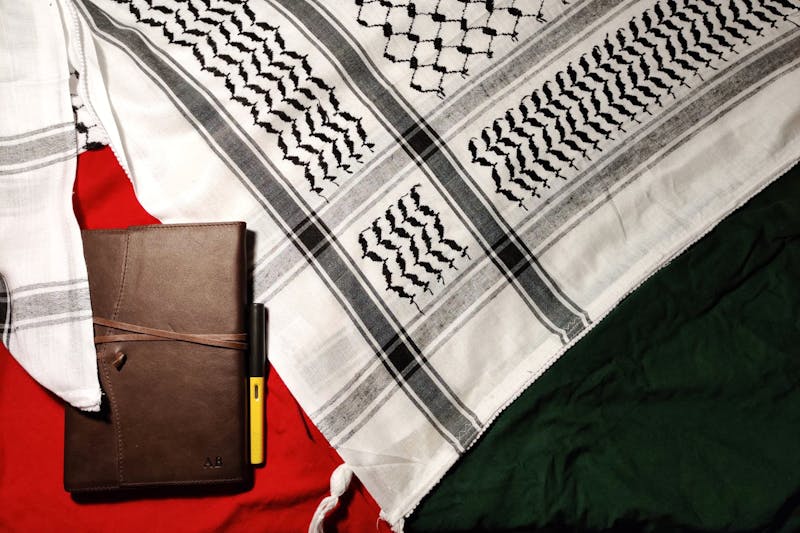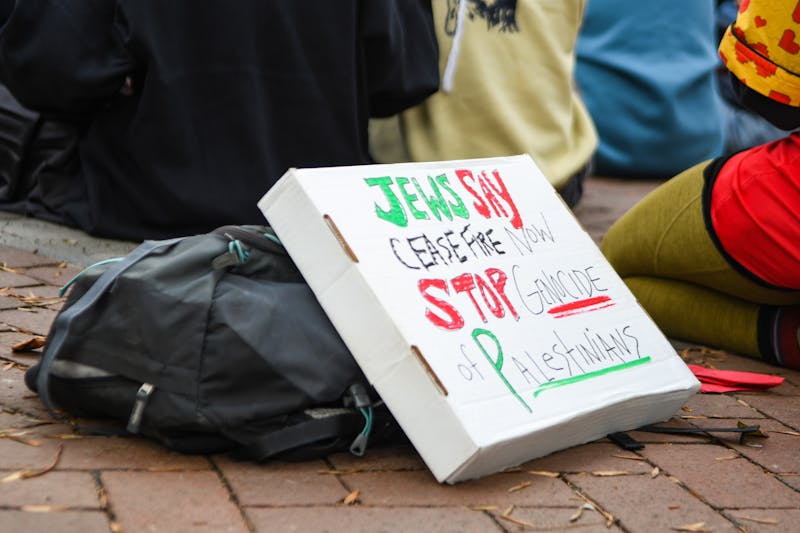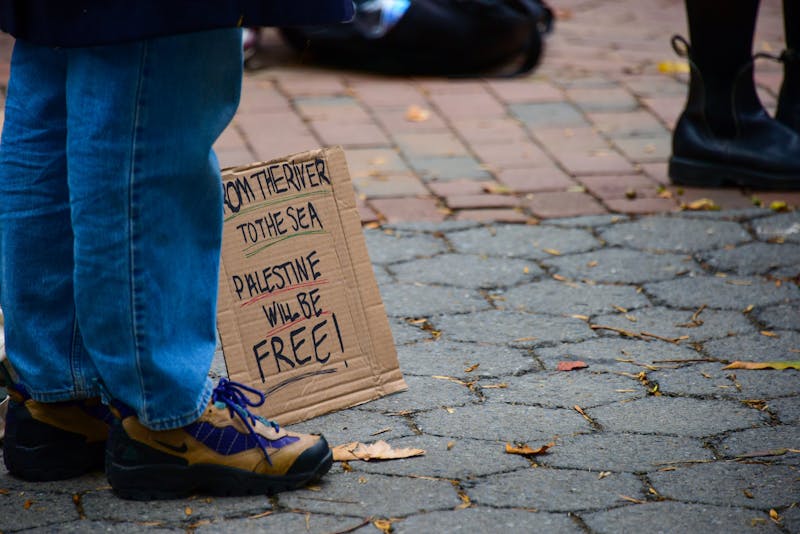
Guest Columnist Omar Khoury reflects on the discrimination he faced during his time at Penn.
Credit: Isa MerriamI believe that every person should be treasured. That every soul bears some semblance to mine. I’d like to think that these beliefs have carried me far in life. But I remember one day eight years ago, during an interaction with a prominent member of Penn’s community, these convictions led me astray. It is not that I doubt their truth. But through my encounter with this person, I learned that not all people wish to live their lives abiding by such beliefs.
The wounds of this lesson linger within me, even now, thousands of days later. And I was reminded yet again of that very same lesson through a photo of that very same person, still a prominent member of Penn’s community. The photo was taken a few weeks ago, when several dozen Penn community members, funded by multiple Penn-affiliated sponsors, including Penn Hillel, met with Israeli President Isaac Herzog. Among the many faces in that photo that gleamed — for better or for worse — without shame is the face of this person responsible for this lesson.
By sharing my interaction with them, I do not wish to cause them harm. I specifically do not identify them out of respect for their privacy. By sharing this story, I do not wish to detract attention from other incidents of hate on campus, including the very real danger of antisemitism at Penn. I do not want this piece to speak over other voices of those who have experienced hate or prejudice, physical intimidation, explicit Islamophobia, or spray-painted swastikas. I share my story to bind our struggles and to intertwine our hopes.
I want the story of the hate I felt on campus to coexist with the stories of others who have felt hate on campus, so that we are each reminded by way of each other’s pain that our stories, and indeed our souls, bear great semblance to each other.
**
During the week of March 21, 2016, I was on Locust Walk when I approached a table near the compass. Several people were at the table, including some small children and the person I identified above. The children were handing out small, triangle-shaped cookies in commemoration of the Jewish holiday of Purim. Admittedly, I was a bit hungry (and, regrettably, I do have a bit of a sweet tooth), so I approached this person and struck up a conversation with them in the hopes that the children would give me a cookie or two.
The first few minutes of the interaction were nothing short of cordial. My curiosity about the Jewish holiday of Purim, coupled with this person’s receptivity to my questions and their passion about their heritage, made for riveting discussion. The children handed me a cookie and then later started playing a game of tag. I had learned from this person that the cookie represents a pocket (or to some, an ear) and that the holiday is a commemoration of the saving of the Jewish people from a sinister scheme. I was most moved in that the origins of this holiday trace back to more than 2,500 years ago. Its continued commemoration speaks to the resilience of the Jewish people and is a beautiful affirmation of Jewish peoplehood.
This person then asked me where I was from. I told them that I am an American immigrant, a Palestinian Christian born in Jordan and who came to the U.S. at a young age.
“You’re not from Palestine. You mean you’re from Jordan,” they retorted.
Brushing aside this remark as a simple misunderstanding, I corrected them that, though I was born in Jordan, I am not just Jordanian. I identify by blood, and indeed by spirit, as a Palestinian. And my family comes from Palestine.
“No,” they stated curtly. “Palestine does not exist.”
I had felt hate on our campus. This person no longer sought to deepen our nascent connection but instead to deny my identity outright. Their spiteful words lodged themselves like a boastful dagger into my soul. I looked back at the children, who were now shepherding squirrels. I recall how I envied that their innocence persisted so stubbornly, and yet so proximately, to where mine had been shattered into many tender pieces. I glanced back at this person, whose grin was just as derisive then as it is in their golden photo op. I returned the treat and walked away in sadness, dwelling on a newly discovered pain.
“And yet it does,” I uttered under my breath.
**
I am older now. A few tears wiser. A few more shades less naïve. I know that this encounter was by no means an atrocity. It did not render Penn uninhabitable. Worse things have happened on campus. What makes this parable worth sharing now, nearly three thousand days later, is that this person is still a prominent member of Penn’s community. This person still commands the respect of Penn as an institution by representing it on a faculty trip to Israel. In this photo, I see Penn outwardly championing this person, who blatantly showed me, a Palestinian-American first-year, their hate by denying my identity. I see Penn affirming that same hate in being represented by this same person standing alongside Mr. Herzog.
Last month, for better or for worse, our president resigned after a historically short-lived tenure, buckling under immense donor pressure that cited her inadequate response to antisemitism at Penn and the egregious crime of permitting a Palestinian literature festival to congregate on campus. Following her resignation, Penn’s administration pledged to confront and condemn all forms of hate, with Interim President Jameson recently stating that “hate has no home at Penn.”
Hate should have no home with those who represent Penn, too. Any good-willed member of the Penn community would agree. It is loyalty to my alma mater that informs my decision to revisit this memory and to publish this account of the hate I felt on our campus.
The only thing that saddens me is the misgiving I have that, ultimately, my story will not matter.
Indeed, I do not expect Penn to issue a strongly worded statement distancing itself from this throng of Penn representatives that stood so openly — who grinned so fervently — next to a person who professed that an “entire nation…is responsible” for the heinous terror attacks of October 7. It will instead honorably decline to comment. I do not believe that Penn will reevaluate its relationship with Mr. Herzog following his statements that deny the existence of a legal distinction between civilians and combatants. I am not so naïve. And neither do I want Penn to condemn that Mr. Herzog personally signed the bombs that have in turn leveled entire neighborhoods in Gaza, that have mercilessly uprooted the unoffending dead from their unavailing graves, and that have sent well before their time a great many more people to join them in their rotting atop of the Earth. For I know that to take such a stand is expensive, and I want Penn’s $21 billion endowment to grow.
But I do wish for Penn to listen to this story because I feel, for better or for worse, that this photo deserves to be met with more outrage. I feel it wrong that an esteemed member of our community still represents Penn at its highest echelons when they violated, through a hate that I, Omar Saeb Khoury, felt on our campus, one of its most solemn principles: not to give hate a home.
By quoting the Jewish readings of Pirkei Avot, I want Penn to hear this story because it must know that, in its noble mission to eradicate hate on campus, it is “not obligated to complete the work, but neither is it free to desist from it.” And now that I have shared a story of a hate I felt, neither is Penn free to decline to comment on it, too.
May my story — and the many others like it — orient Penn in relation to the needful steps to be taken. May my story — and the many others like it — affirm that hate has no place at Penn, neither on campus nor its behalf.
OMAR KHOURY is a 2023 Penn Carey Law graduate and 2019 College graduate in Modern Middle Eastern Studies and English. His email address is okhoury@sas.upenn.edu.
The Daily Pennsylvanian is an independent, student-run newspaper. Please consider making a donation to support the coverage that shapes the University. Your generosity ensures a future of strong journalism at Penn.
Donate












